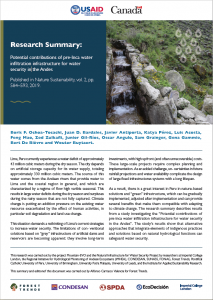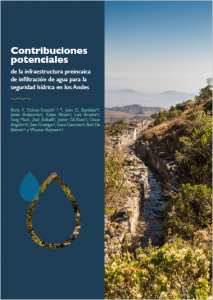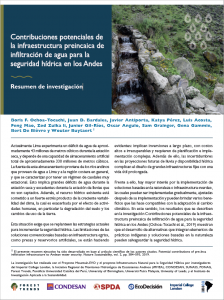Óscar Angulo
Leader, Natural Infrastructure for Drinking WaterNatural Infrastructure for Water Security (NIWS) Project

Óscar is a biologist with an MSc in Integrated Water Management from University of Queensland, Monash University, Griffith University, and Western Australia University. He is a senior lecturer at Catholic University (PUCP) and Scientific University of the South (UCSUR) in Peru and has more than ten years experience working in public and private institutions. His main areas of research are natural resource management, integrated water resource management in both rural and urban areas, community development, green infrastructure public investment, and drinking water & sanitation programs.
His work with Forest Trends, to date, has focused on the development of environmentally sustainable socio-economic strategies, integrating socio-economic and hydrological monitoring, and evaluating natural infrastructure investment.
Research Summary: Potential contributions of pre-Inca water infiltration infrastructure for water security in the Andes
By Boris F. Ochoa-Tocachi, Juan D. Bardales, Javier Antiporta, Katya Pérez, Luis Acosta, Feng Mao, Zed Zulkafli, Junior Gil-Ríos, Oscar Angulo, Sam Grainger, Gena Gammie, Bert De Bièvre, and Wouter Buytaert View PublicationThere is great interest in Peru in nature-based solutions and “green” infrastructure, which can be gradually implemented, adjusted after implementation and can provide several benefits that make them compatible with adapting to climate change. This research summary describes results from a study published in Nature Sustainability, “Potential contributions of pre-Inca water infiltration infrastructure for water[…]
Contribuciones potenciales de la infraestructura preincaica de infiltración de agua para la seguridad hídrica en los Andes
By Boris F. Ochoa-Tocachi, Juan D. Bardales, Javier Antiporta, Katya Pérez, Luis Acosta, Feng Mao, Zed Zulkafli, Junior Gil-Ríos, Oscar Angulo, Sam Grainger, Gena Gammie, Bert De Bièvre y Wouter Buytaert View PublicationA nivel mundial, los recursos hídricos están sometidos a un fuerte estrés producto de la creciente variabilidad climática y las presiones ejercidas por el ser humano. En los Andes tropicales, las culturas preincaicas desarrollaron tecnologías de siembra y cosecha de agua basadas en la naturaleza para manejar los riesgos de sequías en climas naturales extremos. […]



